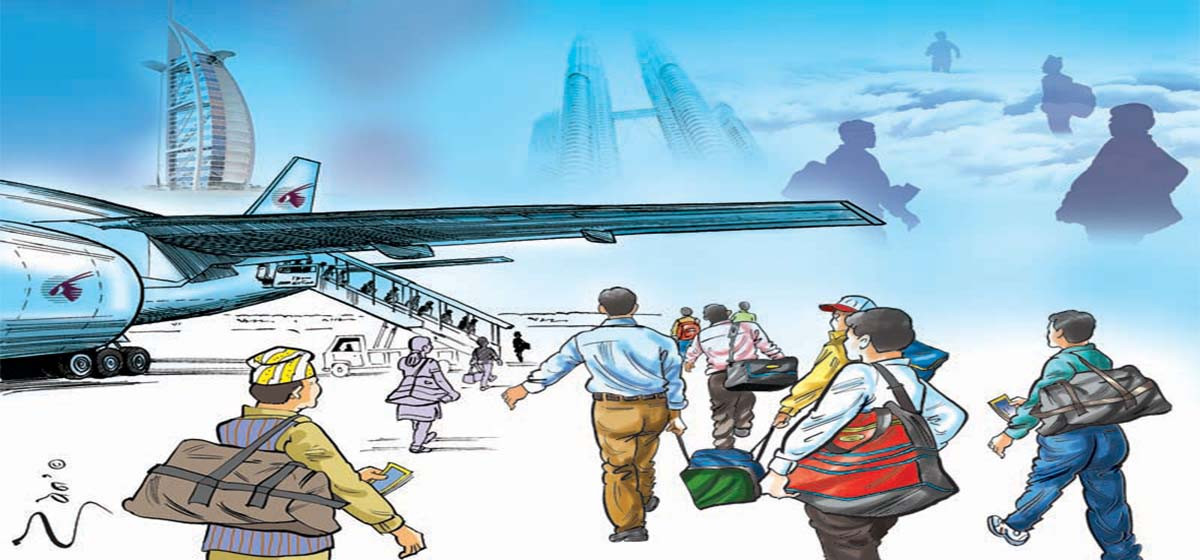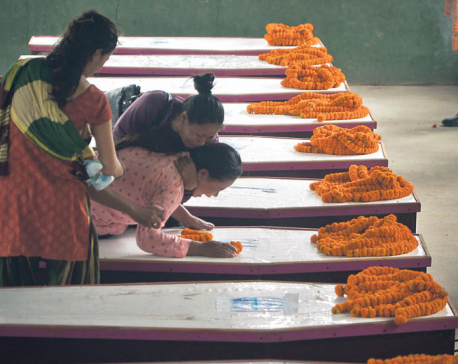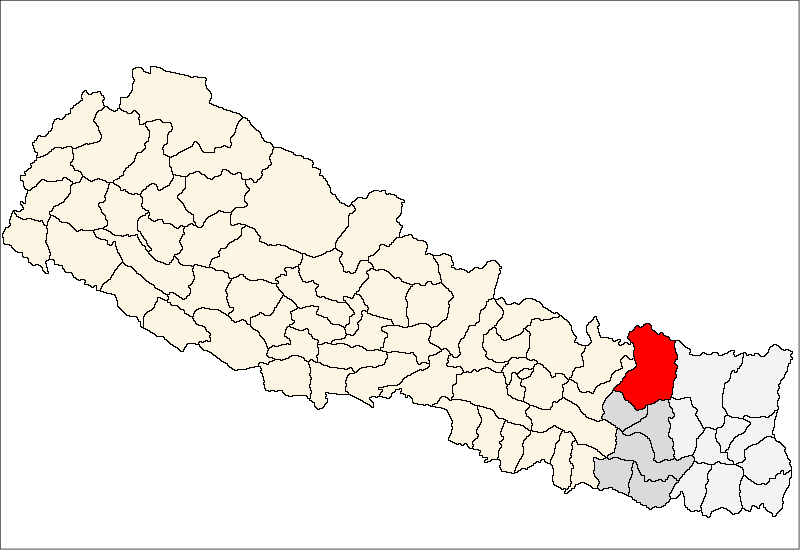
OR
Nepal: The ‘Lahure’ legacy continues albeit in different forms and destinations
Published On: February 19, 2024 07:05 PM NPT By: Sabita Khadka

KATHMANDU, Feb 19: The tradition of the recruitment of Gorkha Soldiers locally known as 'Lahure' in Nepali society is about two hundred years old. Nepalis currently working abroad are, in one way or another, giving continuity to the same Lahure tradition. In the past, it was believed that one was going to be a Lahure if one crossed the border at Sunauli. One going to join the British Gurkha or the Indian Gurkha army is considered a ‘Lahure’ even today.
Some Nepali youths who fought in the Nepal-British war (1871-72) and the subsequent war, reached Lahore to join the army of King Ranjit Singh of Punjab. The term ‘Lahure’ is commonly associated with Lahore.
Since Nepalis joined King Ranjit's army, ‘Lahure’ has become not only a tradition but also a cultural phenomenon.
A kind of festive atmosphere is created in the village with the return of Nepalis from abroad. The tradition of enlisting in the British army as a source of employment became established after the Sugauli Treaty.
In the same way, Nepali youths started being recruited into the British and Indian armies. After signing the tripartite treaty between Nepal, Britain and India in 1947, Gurkha soldiers began serving in Britain and India. Also, Britain sends security personnel for the Singapore Police and Brunei from among the Gurkha soldiers recruited in this way.
Households having a Lahure in the family were naturally financially strong, with distinct household practices. Nowadays, families of young people earning abroad in countries such as Malaysia, the Gulf or South Korea are leading happier lives. Their children receive better education, and even investments are done in fixed assets such as purchasing a small plot of land, improving the living standard.
Pokhara, Dharan, and Butwal - some cities in Nepal are believed to have a major population of Lahure. Like those who migrate to cities for their children’s education, those going abroad for employment also contribute to their children’s education. Some choose to enlist in the Indian and British armies, while others seek foreign employment of other forms.
Unemployed youth want to go abroad even by taking loans. Therefore, there are no such families in the villages, whose members have not gone abroad seeking employment opportunities. On the other hand, the number of laborers in the country has decreased and even agricultural land has been left fallow as youths have migrated abroad for employment.
Labor is the goal of the Lahure who is seeking foreign employment in urban areas or abroad. The primary reason for Nepali emigration is employment, as Nepali youths feel compelled to seek opportunities abroad. If youths fail to work abroad, their families face financial hardships.
In the past, the destination countries of Nepalis were Burma, Bhutan, India, Thailand, Tibet, and Malaysia. According to the data, Nepalis have entered the labor markets of about 111 countries, with individuals working in 178 countries worldwide for foreign employment.
'Free Visa Free Ticket' policies have been implemented for six Gulf countries and seven other countries including Malaysia. Additionally, bilateral labor agreements have been concluded with 12 countries.
Although the practice of Nepalis working abroad is old, the government has started policy and institutional efforts related to foreign employment in Nepal by issuing the Foreign Employment Act in 2042 BS.
After realizing the importance of foreign employment, efforts to identify destination countries have gained significance.
Since February 13, 1998, the facility of making passports for common Nepalis started from the district administration offices, and the tendency of Nepalis from rural areas to go for foreign employment has increased. Even after Nepal adopted the policy of globalization and liberalization in 1990, discussions on foreign employment gained momentum.
Due to the growing population, the lack of jobs within the country, political instability, corruption and the Maoist armed conflict that started in 1996, the trend of young people going abroad for employment intensified.
On the one hand, there is a lack of entrepreneurs in the country and on the other, foreign employment has become the only option for youths who are burdened with family responsibilities. The liberal democratic governance system has facilitated passport issuance for youths.
The Foreign Employment Act, 2064 BS was issued with the aim of bringing contemporary reforms to deal with the complexities and increasing workload of foreign employment. Likewise, the Department of Foreign Employment (DoFE) was established on December 31, 2008, separate from the Department of Labour and Occupational Safety.
With the increasing number of unemployed individuals in Nepal, foreign employment has become crucial, as the country’s internal labor market and economy cannot support them all.
The number of workers seeking foreign employment has increased after the normalization of the COVID-19 epidemic. In the fiscal year 2078/79 BS, 630,000 Nepalis sought work in different countries, with the number increasing to 771,327 in the last year 2079/80 BS. Daily, around 3,000 young people leave the country, seeking foreign employment.
In this way, the number of people who are legally going to work abroad daily is also high. The old tradition of migrating to different cities of neighboring India and returning with earnings continues. Similarly, the statistics of people seeking foreign employment in India remains unascertained.
Nowadays, foreign employment serves as the backbone of the national economy. Nepal's recent journey in foreign employment presents both opportunities and risks in a short period.
While some returning youths rejoice with their families, others face hardships, with some even returning in coffins.
Many individuals are compelled to seek foreign employment due to the perception that nothing is possible in Nepal and the lack of suitable job opportunities within the country.
In the past, those returning from abroad were highly respected in society, but the practice of flaunting their economic prosperity is now outdated. The fact that the country's economy has depended on the remittances sent by those who have gone for foreign employment has highlighted the overall situation of Nepal's foreign employment.
The number of individuals seeking employment in Gulf countries (Qatar, Saudi Arabia, UAE, Kuwait, Bahrain, and Oman) and Malaysia is increasing. Quite a few number of Nepali workers have also migrated to countries like America, Australia, and Canada for employment.
Especially, the trend of Nepalis going to the Middle East, Korea, and Malaysia has seen a slight change of late with Nepalis choosing to go to Europe for foreign employment which is a positive development. The data shows that over the past two decades the crowd of youths who would opt for the Gulf countries is gradually shifting toward Europe and East Asian countries.
Accordingly, there is growing enthusiasm for seeking employment in Europe. Within the seven months of the current fiscal year 2080/81BS, the number of young people seeking employment in countries like Croatia, Malta, Poland, and Romania has reached 18,179.
The destination for Nepali workers seeking foreign employment is changing, with the number of individuals seeking work permits continuously increasing in recent years.
From 2,013 to 7,745 individuals obtaining work permits in the fiscal year 2050/51 BS to 2054/55 BS, the number increased rapidly to over 100,000 annually by the fiscal year 2058/59 BS. In the last fiscal year 2079/80 BS, the number further increased to 771,327. Overall, from the fiscal year 2051/52 BS to the fiscal year 2079/80 BS, a total of 9,059,662 individuals have gone abroad with work permits.
About thousands of youths from villages and cities have migrated abroad in search of work. While seeking employment abroad, it is beneficial to be skilled rather than unskilled. However, the country needs to explore employment opportunities within home as an alternative to discourage foreign employment options.
Rather than sending the youths abroad, the government should prioritize job creation within the country. While it is understandable to seek opportunities abroad when there is a good opportunity. Citizens of democratic countries have the freedom to work abroad freely. However, it is now crucial to redefine the Lahure legacy. Creating an environment where Nepali labor can flourish within Nepal aligns with the objective of a democratic society.
You May Like This

Number of Nepali workers going abroad increases by 3.68 times
KATHMANDU, July 16: Department of Foreign Employment (DoFE) has said that the number of workers going abroad has increased by... Read More...

Home they came back in coffins
Why have so many people chosen to go to the foreign countries to work despite a risk of death? Why... Read More...

Making foreign employment systematic
Now Department of Foreign Employment has prohibited as many as 53 Malaysian companies from hiring Nepali workers due to their... Read More...




Just In
- NEA Provincial Office initiates contract termination process with six companies
- Nepal's ready-made garment exports soar to over 9 billion rupees
- Vote count update: UML candidate continues to maintain lead in Bajhang
- Govt to provide up to Rs 500,000 for building houses affected by natural calamities
- China announces implementation of free visa for Nepali citizens
- NEPSE gains 14.33 points, while daily turnover inclines to Rs 2.68 billion
- Tourists suffer after flight disruption due to adverse weather in Solukhumbu district
- Vote count update: NC maintains lead in Ilam-2













Leave A Comment